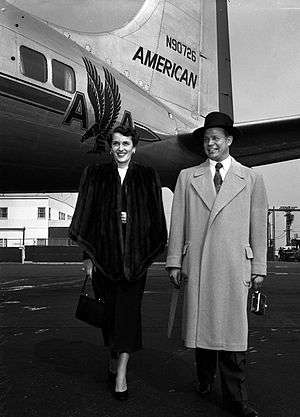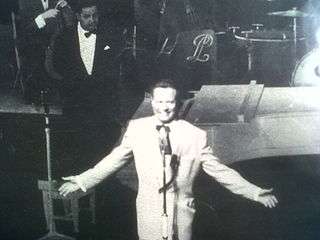Billy Daniels

William Boone Daniels (September 12, 1915 – October 7, 1988), better known as Billy Daniels, was an American singer active in the United States and Europe from the mid-1930s to 1988, notable for his hit recording of "That Old Black Magic" and his pioneering performances on early 1950s television.
Biography
Daniels was born in Jacksonville, Florida, where his father was a postmaster and notary. His mother was a schoolteacher and organist. Daniels had a heritage of Portuguese sailor, Native American (Choctaw), African American, and frontiersman Daniel Boone.
In 1935, Daniels moved from Jacksonville to New York to attend Columbia University. He planned to become a lawyer, but he was sidetracked during the Depression. His grandmother was a seamstress in Harlem for the Ziegfeld Follies, and she encouraged her grandson to sing at Dickie Wells, the club where he first worked as a dishwasher, then a singing waiter. There he was discovered by bandleader Erskine Hawkins, who hired him as a featured vocalist. He toured with the Erskine Hawkins Band in 1935–36 and then returned to Harlem. Throughout 1938, he sang daily on New York radio for 12 different sponsors. "It was me or the horse racing," Daniels remarked.
Daniels performed frequently at nightclubs on New York's famed 52nd Street, where he was one of the first singers to leave the big-band scene and pursue a solo career. He sometimes made three 52nd Street club performances per night. In 1945, he played intermission with Charlie Parker at the Spotlite Club on 52nd Street.
Daniels had several accompanists, including Nat Cole, while in New York. In 1948, he teamed with ex-big-band pianist Benny Payne, who had been Cab Calloway's pianist in the Cotton Club. Payne remained as accompanist for the rest of Daniel's career.
"That Old Black Magic"
Daniels' first trademark song from his time on New York radio was the song "Diane," which he recorded on Bluebird in 1941. His later signature song was "That Old Black Magic", by Harold Arlen and Johnny Mercer, which Daniels first recorded for Apollo Records in 1948. His 1950 recording on Mercury became a hit, selling in the millions. His sensational performance in 1950 in Bill Miller's Riveria Club led to holdover appearances. Following Park Avenue residences, Daniels record holdover at 1952 New York Copacabana Club still stands.

He was popular in Europe after he headlined at the London Palladium in 1952, having broken the house records. He toured the UK's Moss Theatre circuit in the 1950s as "America's most exciting singer". His forte was as a nightclub entertainer, and he was the biggest cabaret draw in New York throughout the 1950s, appearing alongside the comedian Jimmy Durante. His vocal stylings and trademark dance movements were widely imitated by the impressionists of the era. In 1958, Daniels was the first entertainer to sign a longterm contract to appear in Las Vegas for three years at the Stardust.
Broadway
He had performed in musicals on Broadway early in his career with a minor role in a short-lived musical, Memphis Bound (1945). More notable was the long run (700+ performances) of Golden Boy with Sammy Davis Jr. in 1964, directed by Arthur Penn. Daniels toured the US in 1975 with Pearl Bailey in the all-black Hello, Dolly!, and in London's West End, he headlined a 1978 presentation of Bubbling Brown Sugar. He was popular in Australia where he first toured with the Andrews Sisters in 1954.
Films and television
He was a pioneer in the new medium of television with his own television series on ABC in 1952. The Billy Daniels Show was sponsored by Rybutol, a popular vitamin tablet at the time. This 15-minute show, telecast from New York on Sunday evenings from what was later to become The Ed Sullivan Theater (and now The Late Show) was a milestone: the first sponsored network television series starring a black performer. He appeared on television in the US and UK and Australia and Canada throughout the 1950s and 1960s with performances on The Milton Berle Show and 'The Ed Sullivan Show.
His films include When You're Smiling (Columbia, 1950) "On the Sunny Side of the Street (Columbia 1951) and Columbia's Rainbow 'Round My Shoulder (Columbia, 1952).
Daniels' recordings cover the period of transition from 78-rpm to the dawn of microgroove recording. Remembered mostly for his charismatic live performances, he made an album at Abbey Road, The Magic of Billy Daniels (1978), which contained a disco version of "That Old Black Magic". He recorded one of the first soul records, "Woe Woe Woe", a now rare recording.
Personal life
He had four daughters and four sons. He died at the age of 73 in Los Angeles, California, and was buried at the El Camino Memorial Park in Sorrento Valley, San Diego, California.[1] He was one of the first African-American entertainers to cross over into the mainstream and his star on the Hollywood Walk of Fame lies alongside that of Jerry Lewis.
Discography
- 1952 You Go to My Head (Mercury)
- 1954 Love Me or Leave Me (Mercury MG-20047)
- 1957 You Go to My Head (Verve)
- 1958 The Masculine Touch (Verve)
- 1960 Touch of Your Lips (Pickwick)
- 1963 Love Songs For A Fool" (Wing)
- 1978 The Magic Of Billy Daniels (Music For Pleasure)
- 1993 Billy Daniels at the Crescendo (GNP)
- 2001 Mr. Black Magic (GNP/Crescendo)
- 2003 Around Midnight (Sepia Records)
- 2004 The Legendary Billy Daniels (Sepia Records)
Filmography
- 1948 Sepia Cinderella
- 1950 When You're Smiling
- 1951 Rainbow 'Round My Shoulder
- 1952 Sunny Side of the Street
- 1959 Night of the Quarter Moon
- 1959 The Beat Generation
- 1959 The Big Operator
- 2009 That Old Black Magic (Arkadia Jazz DVD)[2]
Trivia
- Daniels recorded a disco version of "That Old Black Magic" in 1975.[3]
- Daniels' daughter, Yvonne, followed in her father's footsteps by entering the music field as a disc jockey, known as Chicago's "First Lady of Radio." She pioneered the radio business in the 1960s by being the voice of evening drive (7 p.m. to 10 p.m.) on Chicago's WSDM-FM, the first All Woman Jazz Station (Smack Dab in the Middle of the FM Dial) owned by Lenny Chess. She was notable for her 1973–82 stint at WLS. Her public radio show on Gannett-owned WGCI-FM Radio from 1982 to 1989 was ranked number 1 in the Chicago market's Arbitron ratings. She finished her broadcast career co-hosting morning drive with Ramsey Lewis on Chicago's WNUA-FM Radio, a smooth jazz station. After she died of breast cancer in 1991, In 1995, Yvonne was posthumously inducted into the National Radio Hall of Fame. Like her father, Yvonne was a barrier-breaker, but even more so because she broke the gender as well as the racial barrier, being the first woman to host a music show on a major Chicago radio station in the 1970s.[4]
- Daniels was married three times: Florence Clotworthy (died 1947); Martha Braun (divorced 1953); and Pierrette (from 1955 to his death in 1988).
- Pierrette H. Daniels, Billy's wife (deceased 2011), and their daughter Dominique Daniels founded a 501 (C) 3, a non-profit organization, the Billy Daniels Foundation, raising money for underserved youths seeking Arts Education support in her late husband's name.[5] Daughter Dominique Daniels, is Chief Executive Officer of the Billy Daniels Foundation.
- In the original script for the movie Goodfellas (working title: "Wiseguys") the narration of the character Karen Hill was to include, "One night, Billy Daniels sent us champagne. There was nothing like it." However, in the final version of the movie, the name was changed to Bobby Vinton.[6][7]
- Daniels English son Jack, from a between marriage relationship with English cabaret singer Rae Croft, only discovered his true father's identity aged 40; never met his father "I'm a Jack Daniels" ran the headline in The Sun newspaper.
- Billy Daniels had two sons, from England, prior to his marriage to Pierrette Cameron in 1955. His second son Wayne Daniels an artist knew his father and communicated with him often. Wayne Daniels has two children, Adam and Rebecca Daniels who is an upcoming jazz vocalist.
References
- ↑ Billy Daniels at Find a Grave
- ↑ Arkadia DVD Listing
- ↑ "Billy Daniels". All Media Guide. Answers.com. Retrieved 2006-12-10.
- ↑ "Rock Radio Scrapbook "Aircheck of the Week" for week of December 3". Retrieved 2006-12-10.
- ↑ Billy Daniels Foundation
- ↑ Goodfellas Screenplay (PDF), posted November 2, 2010
- ↑ Goodfellas Memorable quotes
Further reading
- The Street That Never Slept by Arnold Shaw. Coward, McCann & Geoghan, 1971. Chapter 14 is about Daniels, plus other references appear throughout.